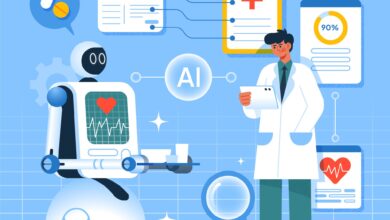Chatbots and Beyond: How Conversational AI Is Transforming Healthcare

7 Leading Edge Healthcare Conversational AI Tools
The intersection of artificial intelligence and healthcare is not a new story, but with the advent of conversational AI an exciting new chapter is emerging! These AI-driven platforms, which include chatbots, virtual health assistants, and more, are not just reshaping the landscape of healthcare; they’re completely redefining it. From personalized medicine to innovative marketing strategies, conversational AI is becoming a critical component in delivering patient-centric care, educating patients, and streamlining clinical operations.
Personalized Medicine and Patient-Centric Care with Conversational AI
The vision of personalized medicine is to tailor treatment to the individual characteristics of each patient, and conversational AI is playing a pivotal role in making this a reality. AI-driven chatbots can analyze vast amounts of patient data, including genetic information, to help healthcare providers identify the most effective treatments for individual patients. They’re also becoming a mainstay in patient-centric care, offering 24/7 support and answering patient queries in real-time, which can significantly enhance the patient experience and outcomes.
For instance, consider “Molly,” a virtual nurse assistant created by Sensely, which uses machine learning to support patients with chronic conditions by tracking their symptoms and offering advice. By delivering a personalized touch, Molly helps patients manage their health more effectively, leading to better health outcomes and a more personable healthcare experience.
Innovative Marketing Strategies and Market Access with Conversational AI
In the highly competitive healthcare sector, conversational AI is also emerging as a powerful tool for marketing. Pharmaceutical companies and healthcare providers are utilizing AI chatbots to engage with potential customers, provide instant information about drugs and therapies, and cut through the noise of traditional marketing channels. These chatbots can initiate interactions based on user behavior, providing a more targeted marketing approach.
Take, for example, the chatbot developed by GYANT, which helps pharmaceutical companies educate physicians about new drugs. By engaging doctors in a conversational manner, this AI-driven tool provides valuable insights into drug interactions and patient management, offering a unique marketing strategy that also aids in better patient care.
Patient Education and Support with Conversational AI
Conversational AI is also revolutionizing patient education and support. Healthcare providers are deploying chatbots to disseminate information about diseases, treatments, and healthy living practices. These bots are available around the clock, delivering consistent information and answering questions that patients may have outside of regular consultation hours.
Ada Health’s AI-powered app is an excellent illustration of this. It allows users to input their symptoms and receive potential diagnoses and guidance. This not only educates patients about their health but also directs them to appropriate care when necessary, potentially decreasing unnecessary doctor visits and the associated healthcare costs.
Clinical Trial Recruiting with Conversational AI
Recruiting patients for clinical trials is a notoriously challenging and expensive process, but conversational AI is beginning to change that. By interacting with potential participants, AI can quickly ascertain eligibility for trials, improve the enrollment process, and retain participants through regular communication. This not only reduces the cost and time involved in recruiting but also ensures a more diverse participant pool, which is crucial for the success of clinical trials.
One striking case is that of the virtual assistant developed by Antidote, which matches patients with clinical trials. By asking users a series of questions, the AI system can determine eligibility for various studies, simplifying the process for patients and researchers alike.
3-5 Year Possible Evolution of Conversational AI in Healthcare
Looking ahead, the next three to five years are poised to be an era of accelerated growth and innovation for conversational AI in healthcare. With advancements in natural language processing and machine learning, we can expect these technologies to become more intuitive and capable of handling complex interactions.
In the near future, we might see AI assistants that can predict health issues before they occur, provide even more personalized recommendations for care, and seamlessly integrate with wearable technologies to monitor patient health in real-time. The evolution of AI could also lead to its increased use in mental health support, offering conversational therapies and support systems for patients with mental health conditions.
Moreover, as conversational AI becomes more advanced, it could play a significant role in reducing healthcare disparities by providing high-quality health information and support in multiple languages and for underserved communities.
In addition to the four companies mentioned above, here are three other significant players to keep a watch on during the next few years:
- Microsoft
- Microsoft has been making waves with its Healthcare Bot service, which empowers healthcare organizations to build and deploy AI-powered, compliant, conversational healthcare experiences. Their bots can be used for a variety of applications, such as handling initial patient contact, triaging symptoms, answering frequently asked questions, and even assisting with mental health issues through therapeutic conversations. By integrating their Azure Health Bot with electronic health records, they’re also enabling more personalized and informed patient interactions.
- Nuance Communications
- A leader in AI for healthcare, Nuance is known for its clinical speech recognition, clinical language understanding, and AI-powered solutions that improve provider-patient interactions. With products like Nuance Dragon Medical One, they offer a voice-directed conversational AI that enables clinicians to update electronic health records (EHRs) using natural speech, thereby saving time and reducing the administrative burden. They’re also exploring AI for predictive health analytics and diagnostics support.
- Babylon Health
- Babylon’s AI technology is designed to make healthcare services more accessible and affordable. With its chatbot and virtual healthcare app, patients can receive medical advice, schedule live consultations with healthcare professionals, and manage their health. Babylon’s AI examines the patient’s history and symptoms to provide health information and recommendations. Their focus on combining AI with human medical expertise is making healthcare more proactive and personalized.
In conclusion, the potential of conversational AI in healthcare is vast and varied. From personalized medicine to innovative marketing and beyond, these tools are transforming the healthcare landscape in ways that were once the realm of science fiction. As AI continues to evolve, it will undoubtedly unlock new possibilities for patient care, making the healthcare system more efficient, accessible, and personalized than ever before. It’s an exciting time for healthcare professionals and patients alike, as we stand on the cusp of a new era of AI-driven healthcare solutions.





